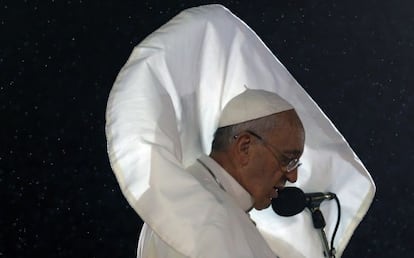Pope Francis backs the demands of protestors
The pontiff urges the youth to fight against corruption


Pope Francis finally reached the outskirts of the city. After repeating for months that the Church should leave the city center - the comfortable palaces of self-absorption - and seek out the slums of the world where bread and justice are lacking, Jorge Mario Bergoglio arrived in a favela in Rio de Janeiro. He greeted the people and delivered a very clear message: ““No amount of pacification will be able to last in a society that ignores, pushes to the margins or excludes a part of itself. The measure of greatness of a society is determined by the way in which it treats the needy, those who have nothing to offer but their poverty.”
After a tour of Varginha, a district with 2,000 people in the heart of the favela Manguinhos, the pope addressed the youth, the real protagonists of the latest demonstrations in Brazil, to urge them not to lose heart: "You have a particular sensibility to injustice, but too often you feel disappointed by corruption, by those who, instead of looking for the common good, are after their own interests. To you and to all I repeat: 'Never lose heart. Do not lose confidence and do not let hope die. Reality can change. Man can change. Do not become accustomed to evil. Defeat it."
Since he began this trip to World Youth Day, Bergoglio's main events -- his statements to the journalists on the plane, the homily in the sanctuary in Aparecida, his message before the drug addicts in St. Francis of Assisi Hospital and his speech in the favela - have made special note of social issues. His events are not intended to reach just those within the Christian community. He wants to go beyond it. The Argentine pope uses his booming popularity to try to influence, to bring change. Once again Bergoglio presents the Church as the companion of good causes, never as the only and exclusive means to achieve them. Before those struggling with addiction and the indigents of the slums, he uses the same formula: "The Church is not immune to your hardships. In fact it joins you in them, with love."
The smiling yet pragmatic pope never talks of Jesus as the Almighty who sees all, ready to condemn to hell those who transgress, but rather as a Christ who doubted and suffered on the cross, always prepared to give a hand. Maybe they belong to the same company and they are selling the same product, but the Spanish Cardinal Rouco Varela - to give just one example - and the Argentine bishop of Rome use different scents. From camphor to cool water. From Christian resignation to holy indignation.
In his speech in the favela, Jorge Mario Bergoglio said: "I would like to call on those who have more resources, on the authorities and on all the men of goodwill committed to social justice. Do not stop working for a more just and caring world. No one can remain indifferent to the injustices that still exist in the world. Let each, according to his possibilities and responsibilities, offer his contribution so that we may end social injustices. It is not the culture of egoism, of individualism, which often rules our society, that creates a more habitable world, but the culture of solidarity. Not looking at the other as a competitor but rather as a brother."
Pope Francis had the people of Varginha in his pocket after two sentences. From the beginning - while he was planning the trip - Francis had said that he wanted to visit the slums. "I would have liked to knock on every door, say good morning, ask for a glass of cool water, have a little coffee. No cachaza," he joked, referring to a type of sugar cane rum. "Talk like old friends, listen to the heart of each one - the parents, the children, the grandparents. But Brazil is huge...So I have come here." To the heart of poverty and violence.
Up to six months ago, the drug lords had control of Manguinhos, fighting tooth and nail against the police and the hitmen. Now a precarious, artificial peace has been imposed by force.
From the 500 slums in Rio, only 20 are now at peace. They are an exception. The reality is tough. Six percent of Brazilians - some 11 million people -- still live in favelas where basic services are a luxury. The friendly papal visit made them visible for a few hours. Amara Oliveira, 82, even did her nails. Her house was among those preselected to receive the pope. Days before the visit she said that all her life she had worked as a ticket clerk in a movie theatre but she never had enough money to go see a film. Such is the lot of those who are not even allowed to dream.
Translation: Dyane Jean François
Tu suscripción se está usando en otro dispositivo
¿Quieres añadir otro usuario a tu suscripción?
Si continúas leyendo en este dispositivo, no se podrá leer en el otro.
FlechaTu suscripción se está usando en otro dispositivo y solo puedes acceder a EL PAÍS desde un dispositivo a la vez.
Si quieres compartir tu cuenta, cambia tu suscripción a la modalidad Premium, así podrás añadir otro usuario. Cada uno accederá con su propia cuenta de email, lo que os permitirá personalizar vuestra experiencia en EL PAÍS.
¿Tienes una suscripción de empresa? Accede aquí para contratar más cuentas.
En el caso de no saber quién está usando tu cuenta, te recomendamos cambiar tu contraseña aquí.
Si decides continuar compartiendo tu cuenta, este mensaje se mostrará en tu dispositivo y en el de la otra persona que está usando tu cuenta de forma indefinida, afectando a tu experiencia de lectura. Puedes consultar aquí los términos y condiciones de la suscripción digital.








































